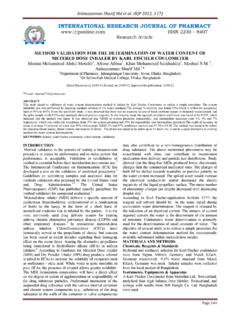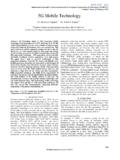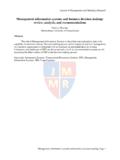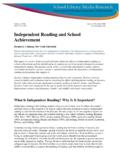Transcription of What Factors Are Associated With Grade Acceleration?
1 248 Volume 20 Number 2 Winter 2009 pp. 248 273aWhat Factors Are Associated with Grade Acceleration? An Analysis and Comparison of Two DatabasesRyan WellsUniversity of Massachusetts AmherstDavid Lohman Maureen MarronThe University of IowaAcceleration is an educational intervention intended to present talented youth with appropriate levels of academic challenge. Formally, acceleration is defined as progress though an edu-cational program at rates faster or ages younger than conven-tional (Pressey, 1949, p. 2). Within this definition, 18 forms of acceleration have been identified (Southern & Jones, 2004), 3 of which are early admission to kindergarten, early admission to first Grade , and Grade skipping. In all three situations, a child is placed ahead of age peers into a classroom with older students.
2 For purposes of this paper, we will use Grade acceleration to refer to these three forms of Grade acceleration has been much studied (Rogers, 2004), there are still gaps in the literature. First, past research has focused primarily on the outcomes of Grade acceleration rather than on the predictors or correlates of being accelerated. Second, Copyright 2009 Prufrock Press, Box 8813, Waco, TX 76714summaryWells, R., Lohman, D., & Marron, M. (2009). What Factors are Associated with Grade acceleration ? An analysis and comparison of two databases. journal of Advanced Academics, 20, 248 benefits of whole- Grade acceleration for the highest achieving stu-dents in K 12 education are widely acknowledged. However, much less is known about which personal, family, and school Factors are correlated with student acceleration .
3 Which children are Grade accel-erated in K 7 education? Have Factors Associated with Grade accelera-tion changed over time? We analyze data from the NELS (students from 1988 1992) and the ELS (students from 2002 2004) nationally repre-sentative and longitudinal databases to answer these questions. other things being equal, females, Asian Americans, and students living on the east or west coast were more likely to be Grade accelerated. For example, females had odds of being accelerated that were times higher than the odds of males being accelerated. Students from the northeastern region of the had odds of acceleration that were nearly twice ( times) as high as Midwest students odds of accelera-tion. When accelerated students were compared to older classmates of similar achievement who were not accelerated, the accelerated students showed greater gains in achievement than nonaccelerated classmates in and throughout high school.
4 In other words, accelerated students do not just keep up with their older classmates, they actually perform of Advanced AcademicsFACToRS Associated with Grade ACCELERATIoNstudies often examine Grade -accelerated youth in isolation rather than in comparison to a nonaccelerated cohort of similar ability or achievement. Third, because educational attitudes and policies change, newer studies are always Present StudyIn this study, we examined data from two national longitudi-nal data sets that followed different student cohorts, specifically, the National Educational Longitudinal Study (NELS) and the Educational Longitudinal Study (ELS), both collected by the National Center for Education Statistics (NCES). The NELS includes a base-year study of a national sample of 24,599 eighth- Grade students in 1988 and multiple follow-up studies.
5 We used data from 1988 to determine the characteristics of stu-dents who had been accelerated before eighth Grade . We also used data from the 1992 follow-up study to investigate academic outcomes during high school following whole- Grade accelera-tion during elementary determine changes across time in the correlates and pre-dictors of acceleration , we also examined data from a more recent cohort of students in the ELS. Data from the ELS include a base-year study of 16,252 10th graders in 2002 and a first follow-up in 2004 when these students were in 12th Grade . We used data from 2002 to determine the characteristics of students who had been accelerated before 10th Grade , and we used data from 2004 to examine some academic outcomes of whole- Grade acceleration for these students. Across both data sets, we investi-gated the demographic and family characteristics that predicted Grade acceleration and some of the cognitive and affective out-comes of Grade of AccelerationAcademic Outcomes.
6 research across many decades has consistently reported positive effects for academic acceleration (Colangelo, 251 Volume 20 Number 2 Winter 2009 Wells, Lohman, & MarronAssouline, & Gross, 2004; Gross & van Vliet, 2005; Kulik, 2004; Kulik & Kulik, 1992; Vialle, Ashton, Carlon, & Rankin, 2001). Rogers (1992) meta-analysis of 314 quantitative or qualitative studies on acceleration found that most showed positive out-comes. Subsequently, Rogers (2004) observed that research on Grade skipping comprises one of the strongest and most-con-sistent bodies of research in the field of gifted education (p. 55). Some of the most convincing evidence has come from studies in which accelerated students were compared with nonacceler-ated students of similar ability. For example, the 26 controlled studies of acceleration in Kulik and Kulik s meta-analysis fell into two groups: comparisons between accelerated and nonacceler-ated students of the same age and IQ and comparisons between accelerated and nonaccelerated students in the same Grade with the same IQ.
7 When students of the same age were compared, achievement tests scores for accelerated students exceeded the achievement of their nonaccelerated age mates by standard deviations or approximately one year on a Grade -equivalent scale. When students in the same Grade with similar IQ scores were compared, the achievement of accelerated students did not differ from the achievement of their older, nonaccelerated classmates. Social and Emotional Outcomes. Students who are accelerated tend to report more positive social and emotional feelings than before acceleration (Kulik & Kulik, 1992; Rogers, 2002; Vialle et al., 2001). For example, Vialle et al. found that students reported high levels of satisfaction academically and emotion-ally regarding acceleration , especially when they were included in the design and execution of the curriculum plan.
8 Gross (2003) reported that profoundly gifted children (IQ 160 and above) who were radically accelerated had more positive and healthier levels of social self-esteem than their nonaccelerated counter-parts. Based on this type of research , Southern, Jones, and Fiscus (1989) observed that many leaders in gifted education consid-ered the acceleration controversy settled. However, Colangelo et al. (2004) have since shown that despite much positive empirical 252 journal of Advanced AcademicsFACToRS Associated with Grade ACCELERATIoNresearch, acceleration is still viewed unfavorably by many teach-ers and school of AccelerationFew researchers have examined the predictors of Grade accel-eration. Studying the predictors of Grade acceleration may be important for several reasons. First, although participation rates in gifted education are lower for students from low-income fami-lies or racial-ethnic minorities (Donovan & Cross, 2002), it is not known whether these students are less likely to be Grade accelerated than other students who show similar levels of aca-demic achievement.
9 For example, Vialle et al. (2001) found that accelerated students believe that parental advocacy and support are essential for successful acceleration . Families of gifted chil-dren tend to exhibit a number of positive characteristics, which include a focus on children, a generally enriched family environ-ment, and parents who model hard work and high achievement (Winner, 1996). However, the specific ways in which parental behaviors and attitudes influence whether a child initially will be Grade accelerated are less well understood. This study will help to fill that gap by examining the relationships between Grade accel-eration and parental involvement and parental rules or regional practices with regard to acceleration may differ, studies have not documented what these regional differences might be.
10 If region matters, then subsequent studies may need to control for its potentially confounding effects when the effects of acceleration across different studies are all, past research has much to say about the positive out-comes of Grade acceleration for prepared students. However, much of this research is lacking in statistical rigor, primarily because it has neglected to compare Grade -accelerated youth to similar-achievement nonaccelerated youth. One exception is Swiatek and Benbow s (1991) longitudinal study of ability matched accelerated and nonaccelerated gifted students, which focused on post-high-school outcomes and self-concept measures. The accelerated and nonaccelerated students who participated in the study did not 253 Volume 20 Number 2 Winter 2009 Wells, Lohman, & Marrondiffer on the academic and psychosocial outcome variables that were studied.






